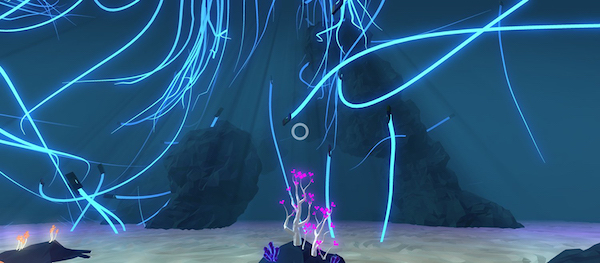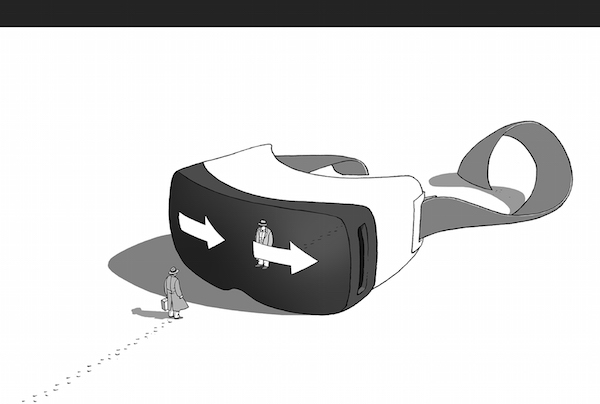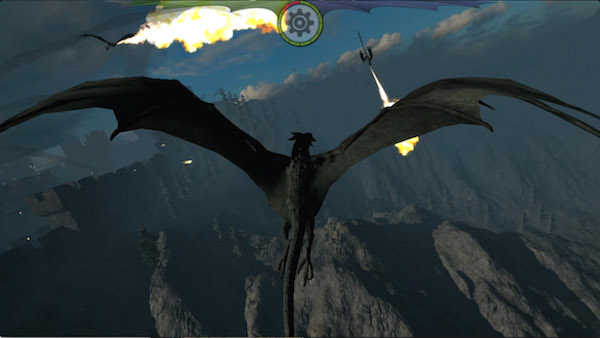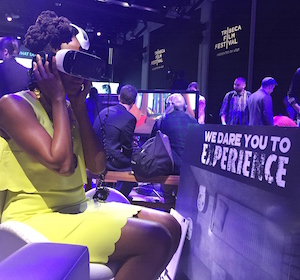
BY CHARLES BATTERSBY | When the Tribeca Film Festival (TFF) began in 2002, video games and interactive entertainment were still struggling to be taken seriously. In recent years, TFF programs like Tribeca Games and Games for Change have done their part to recognize the cultural impact and artistic legitimacy of these forms. This year, the festival takes another step further by augmenting its roster of films with events that take audiences out of the screening room and into new, immersive worlds.
Storyscapes (a collection of interactive installations) returns to TFF this year, with several new virtual reality (VR) options. The Apr. 14–17 programming includes “DEEP VR,” a deep sea simulator that allows players to control the experience through their breathing, a documentary (“The Ark”) that puts the audience face to face with a nearly extinct species of rhinoceros, and “Notes on Blindness: Into Darkness.” Guided by the original audio-diary recordings of John Hull after losing his sight in 1983, a “binaural sound” headset helps users empathize with the way a blind person perceives the world.
Another Storyscapes project represents the first VR game based on a graphic novel (Marc-Antoine Mathieu’s “S.E.N.S.”).

Marie Blondiaux, a producer at Red Corner (the makers of “SENS”), describes what players will find when they put on their VR headseats: “An anonymous wanderer roams in a stripped down yet mysterious universe,” she explains. “You have to find a way within a maze without walls, with only arrows to guide you.” Those arrows manifest themselves in manners both obvious and hidden, often creating optical illusions. Players will control their character within this work, by looking where they want to go, with a motion-sensing helmet.
The Virtual Arcade is a new event for the festival. It also uses VR experiences, and is open from Apr. 18–20. Among the virtual adventures is “Dragonflight,” an aerial combat simulator from Blackthorn Media, which allows players to fly on the back of a dragon.

Although “Dragonflight” has plenty of action, Michael Conelly, Creative Director of Blackthorn Media, says, “There’s a collective hunch that [VR] is a medium that’s here to stay, and that it matters from a storytelling standpoint.” Conelly assures that players who try “Dragonflight” at the arcade “are going to have a hell of an experience meeting our dragon in person. He drops down out of the sky and lands with a THUMP, and looks right at you from just a couple of feet away.
One of the films making its world premiere at TFF is the horror film “Holidays.” A selection in the Midnight series, the anthology puts a grim and occasionally bloody spin on various occasions for celebration during the calendar year. “Holidays: Christmas VR,” was conceived and executed by Scott Stewart, who also did the honors for the Christmas-themed segment of the film.
“In VR,” notes Stewart about the difference between this new medium and traditional cinema, “the viewer is dropped into a 360-degree world wherein they have the freedom to look in any direction at any time. So as a storyteller, you need to view your composition as the ‘world surrounding your viewer.’ It’s more like staging an event around a single audience member.”

Luis Blackaller, the Creative Director at Wevr, the VR production studio behind “Christmas VR,” points out that the narrative experience they provide is “closer to a vivid memory or a lucid dream. When telling a story in VR, it is important to figure out ways to make things come across around the viewer, regardless of what they are looking at. They might be browsing a bookshelf in a studio while the unexpected murder happens just behind their backs, and, yes, they might miss that moment. But they will get what happened because they were there.”
Some of the VR projects in the Virtual Arcade will involve murder and horror. “Killer Deal,” the story of a machete salesman, is a humorous take on classic slasher films. Fans of horror/comedy will recognize its director, Anthony C. Ferrante, from the “Sharknado” films, along with leading man Ian Ziering.
Irad Eyal, writer and producer of “Killer Deal,” says the lighthearted feel of this project will provide the viewer with an experience unique to this new form. “A lot of the VR that you see now is pretty serious,” he notes. “And there’s a place for that. I think VR is really good for documentary film making…but it’s also very heavy. We wanted to give you an alternative to that, with something that’s campy, ridiculous, over the top, funny, and fun.”
Eyal also discusses how audiences respond to the narrative in an interactive VR story, noting how the viewer is “naturally going to follow the action, the same way you would if you were in a room with a monster or a serial killer. You’re going to keep your eye on him.”
Eric Darnell is known for directing animated films like “Madagascar,” but he also wrote and directed the VR project “Invasion,” which makes its debut at the Virtual Arcade. “Invasion” is the story of two cute bunny rabbits who repel an alien attack, with players inhabiting the body of one of those bunnies. VR, says Darnell, “is not just an advancement of cinema. It’s its own medium, with its own language that’s just barely being developed right now. It’s going to take time to realize all of the potential that VR has to offer.”

The Tribeca Film Festival is also hosting its Games and Media Summit for the third year. This Apr. 18 event will feature hands-on play with new VR games, as well as panel discussions with game makers whose topics include how to create games for VR, new “biometric” technology for interacting with games, and using VR for empathy and journalism.
As VR makes strides in being accepted as a form of legitimate storytelling, it is also becoming a more accessible experience to people who might have been turned off by early VR projects. Conelly, of “Dragonflight,” boasts of the refined control scheme to his game, which is intended to help people who are prone to motion sickness. “We don’t want Robert De Niro getting on our dragon and getting queasy,” he jokes.
All events mentioned in this article take place at the Festival Hub (Spring Street Studios, 50 Varick St., btw. Beach & Laight Sts.). Tickets to Storyscapse and Virtual Arcade events are $40 each, with discounted packages available. For more info, visit tribecafilm.com or call 646-502-5296.































